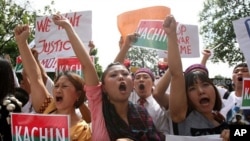In June, an incident at a hydropower dam on the Dabein river, a Chinese-Burmese joint venture put an end to a 17-year ceasefire in Kachin state. Six months and tens of thousands of refugees later, the new Burmese government is making progress towards reform, but has left the Kachin behind.
During her visit to Burma earlier this month, Hillary Clinton said that the one-year civilian government had indeed made significant progress toward reform, under President Thein Sein; but that there is still great room for improvement.
Among the most pressing issues is the systematic militarization of western Burma, where the Burmese military has continued its campaign against ethnic groups in the border areas.
Although the Shan State Army South signed a ceasefire agreement with the government, the Kachin Independence Army has been less lucky. Dau Hkaung, advisor to the KIA General Gun Maw, says the Burmese officials have not offered a political solution to the problem.
"They announce to the international community that Burma is changing. Burma is changing, this fighting is a small matter, it will be finished in a few days," said Dau Hkaung. "But politically, they intentionally want to eliminate all of the political struggling groups. We assume the government will intensify their fighting seriously. Right now it's truly happen to our area."
Dau Hkaung says the most recent push of the Burmese troops has seen them threatening the border town, Ma Ja Yang, which is of strategic importance because of its proximity to hydropower projects and is a hub for border trade. The government's unwillingness to allow the KIA to participate in upcoming elections has further dampened hope for a political solution to the conflict.
Aid groups have been allowed some access to affected areas, but, according to a recent United Nations assessment, accessing affected populations is problematic - so problematic that it is not even clear exactly how many internally displaced people there are.
The assessment found that food and water shortages are of primary concern, and becoming critical in some parts of the state. La Rip, director of a Kachin organization in charge of keeping track of refugees and IDPs, confirmed the findings of the report.
"Actually it is very difficult to get the exact number still we can get the number we have access to," said La Rip. "At the moment, it is already more than 30,000. The main problem the difficulties for IDPs at the moment is food shortage."
Decades of armed conflict in Burma's western border lands have led to widespread allegations of war crimes perpetrated by the Burmese army, including targeting civilians, forced conscription of child soldiers, use of convict porters and using rape as a weapon of war.
Bryan Erykson recently published a report decrying war crimes in Kachin state and says there are easily more than 30,000 people displaced by the conflict.
"We're looking at skirmishes that take place daily across jungle regions. Many of them just go undocumented, so to try to put together the scale of the conflict is difficult," said Erykson. "I think what we can say is that there are populations of civilians in villages and towns anywhere from 200 people to 2,000 people that are being relocated, forced from their homes. As positions get stronger the pushing goes farther in Kachin-controlled area, and so we're seeing more civilians displaced because of that.
Erykson says, as the Burmese troops push further into Kachin controlled areas, more evidence of human rights violations have been found, including torture and extra-judicial killings, as well as evidence of human shielding. The new civilian government has made progress by admitting to holding political prisoners, but has yet to admit to perpetrating war crimes in its border areas.




